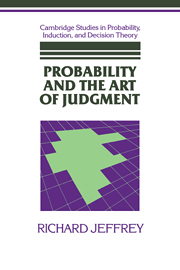Book contents
- Frontmatter
- Contents
- Preface
- 1 Introduction: Radical probabilism (1991)
- 2 Valuation and acceptance of scientific hypotheses (1956)
- 3 Probable knowledge (1968)
- 4 Probability and the art of judgment (1985)
- 5 Bayesianism with a human face (1983)
- 6 Alias Smith and Jones: The testimony of the senses (1987)
- 7 Conditioning, kinematics, and exchangeability (1988)
- 8 Preference among preferences (1974)
- 9 On interpersonal utility theory (1971)
- 10 Remarks on interpersonal utility theory (1974)
- 11 Mises redux (1977)
- 12 Statistical explanation vs. statistical inference (1969)
- 13 New foundations for Bayesian decision theory (1965)
- 14 Frameworks for preference (1974)
- 15 Axiomatizing the logic of decision (1978)
- 16 A note on the kinematics of preference (1977)
12 - Statistical explanation vs. statistical inference (1969)
Published online by Cambridge University Press: 05 June 2012
- Frontmatter
- Contents
- Preface
- 1 Introduction: Radical probabilism (1991)
- 2 Valuation and acceptance of scientific hypotheses (1956)
- 3 Probable knowledge (1968)
- 4 Probability and the art of judgment (1985)
- 5 Bayesianism with a human face (1983)
- 6 Alias Smith and Jones: The testimony of the senses (1987)
- 7 Conditioning, kinematics, and exchangeability (1988)
- 8 Preference among preferences (1974)
- 9 On interpersonal utility theory (1971)
- 10 Remarks on interpersonal utility theory (1974)
- 11 Mises redux (1977)
- 12 Statistical explanation vs. statistical inference (1969)
- 13 New foundations for Bayesian decision theory (1965)
- 14 Frameworks for preference (1974)
- 15 Axiomatizing the logic of decision (1978)
- 16 A note on the kinematics of preference (1977)
Summary
Hempel is not the first philosopher to have held that causal explanations are deductive inferences of a special sort. In the Posterior Analytics Aristotle distinguishes a special sort of deductive inference – the demonstrative syllogism – in these terms:
By demonstration I mean a syllogism productive of scientific knowledge, a syllogism, that is, the grasp of which is eo ipso such knowledge.
He then lays down defining conditions for this special sort of inference:
… the premisses of demonstrated knowledge must be true, primary, immediate, better known than and prior to the conclusion, which is further related to them as effect to cause.
And he remarks,
Syllogism there may indeed be without these conditions, but such syllogism, not being productive of scientific knowledge, will not be demonstration.
Now we can fault this account on various grounds, but so can we fault contemporary accounts. We must give the old man credit; as he says at the end of the Organon (at the end of De Sophisticis Elenchis), his was the first book on logic; and he concludes,
… there must remain for all of you, or for our students, the task of extending us your pardon for the shortcomings of the inquiry, and for the discoveries thereof your warm thanks.
The affinities between the Hempelian and Aristotelian accounts of explanation may be obscured by differences in terminology. Thus, Aristotle speaks of syllogism, Hempel of deductive inference; and Aristotle speaks of knowledge, Hempel of explanation.
- Type
- Chapter
- Information
- Probability and the Art of Judgment , pp. 203 - 212Publisher: Cambridge University PressPrint publication year: 1992



